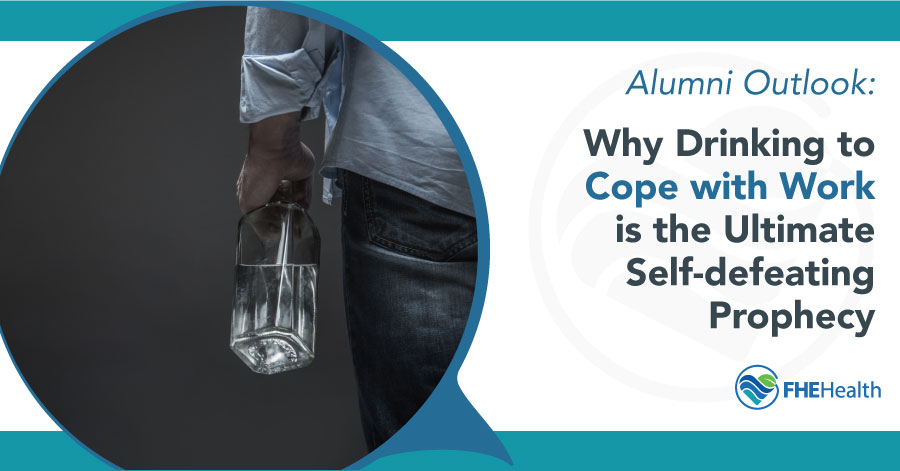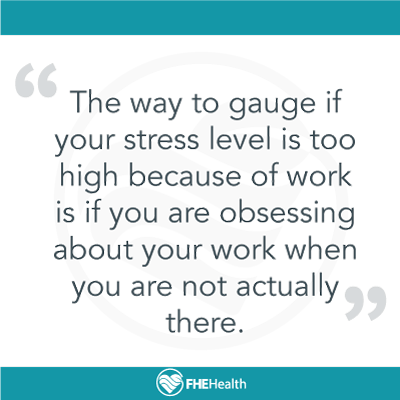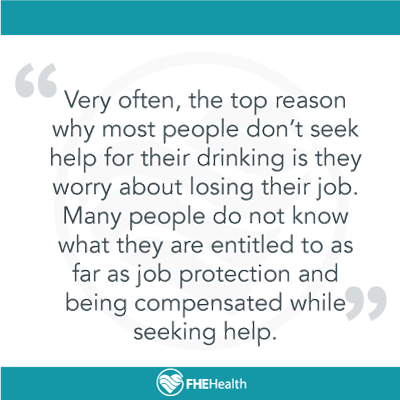
In today’s society, a lot of people base their identity on their employment. What they do, their position, their salary, it’s what a lot of people base whether they are content or not in life. It’s an unfortunate truth but we live in a materialistic society here in the states.
It’s safe to universally say that work, in general, can be stressful. Anxiety and stress can dominate your mind and affect everything else in your life.
There are many healthy ways to cope with stress and anxiety, on the contrary there are a lot of unhealthy ways. A common unhealthy coping mechanism for many is drinking alcohol. In my years of being around alcoholics, their job is at the core of their anxiety and their priorities at the same time.
Full disclosure, I am a case manager for a treatment center, which means I talk with employers of patients that I have all the time. Many of them come for help based on it affecting their job or they fear they are about to lose it due to their drinking.
Stress and Work
 We have all been there, that day from hell that seemed like it was 25 hours long and everything possible wrong thing that could happen, did happen. The day does end at some point, we open the front door to our home and thank the stars that the day is over. This is where the drinking cycle starts for many people.
We have all been there, that day from hell that seemed like it was 25 hours long and everything possible wrong thing that could happen, did happen. The day does end at some point, we open the front door to our home and thank the stars that the day is over. This is where the drinking cycle starts for many people.
SAMHSA performed a study that showed 76% of heavy drinkers are employed. Some reasons work may be so stressful are:
- A boss that is overly demanding or difficult
- The hours are difficult to live with
- Bad coworkers
- Unfair/low paying wages
- Stagnant in your position for too long
- Overwhelming new promotion
- A review or major deadline coming up
The way to gauge if your stress level is too high because of work is if you are obsessing about your work when you are not actually there. Bringing work home with you is what leads to having that glass of wine afterwards. Happy hour was designed for people to come drink after their 9 to 5 job. Guess what? Happy hour is popular!
Why do people turn to that drink or two after work? It actually does the job (no pun intended) and eliminates stress or anxiety, at least temporarily. That’s just the problem, the relief is temporary. We down a drink, the stress melts away for a few hours and then it comes back like it never left. The solution to that? Have another drink!
Thus begins a deadly cycle for so many people.
The Slow Down Spiral
For many adult alcoholics, the road to drinking becoming a real problem is a slow unraveling. What starts as that cocktail after work on a Friday to celebrate the weekend at some point it can evolve into a cocktail every night after work.
Before you know it, it’s not even a thought about drinking after work. In fact, you cannot wait to drive home and have that warm relief come over you. After some time, you start switching liquor stores you go to daily because you feel the employees are judging you (I promise you they don’t care).
Sooner than later the crutch of drinking can bleed into your work life. The never-will’s become reality and your job performance starts to be affected.
That can mean:
- Sneaking drinks in during work
- Calling out because you are too hungover or to start the weekend early (calling out Friday is very common with alcoholics!)
- Efficiency and organization at work takes a dip
- Clashing with coworkers or even worse, your boss
I can say from experience that not every alcoholic with a job drinks at work. I’ve met many who claim to maintain the discipline of zero drinks between 9 to 5, but once it’s five o’clock it’s miller time.
Taking Action
 Very often, the top reason why most people don’t seek help for their drinking is they worry about losing their job. Many people do not know what they are entitled to as far as job protection and being compensated while seeking help.
Very often, the top reason why most people don’t seek help for their drinking is they worry about losing their job. Many people do not know what they are entitled to as far as job protection and being compensated while seeking help.
If you have been at your job for more than a year and work full time (and your employer has over 50 employees), that means you are eligible for FMLA, Family and Medical Leave Act. FMLA is unpaid job protection for when you need to seek medical help. One of those reasons for seeking medical help can be ‘personal illness’ which having a problem with alcohol qualifies for.
You get 12 weeks of FMLA a year, it can be initiated by informing your HR you will be requesting FMLA. Remember this important fact: your HR and your boss will not find out what you are getting help for. They are simply told for an ‘illness’ There are many laws that protect your privacy when needing FMLA. There is no one in your company that you need to disclose that you have a drinking problem.
FMLA is unpaid, but many employers have Short-Term Disability either included in the benefits package or as an elected benefit. STD pays at least 60% of your pay while you are under medical care.
If you didn’t know about these things, now you do.
If any of this article resonates with you, at least find someone to open about it with. A therapist, a friend, someone you can trust. It is possible to stop this vicious cycle before it gets too ugly.
If it is getting ugly for you and you are a hard worker, you have rights and privacy on your side in order to get the help you desperately need. Do not wait until the job fires you or something else terrible to happen.
Seek help now, it’s worth it.






